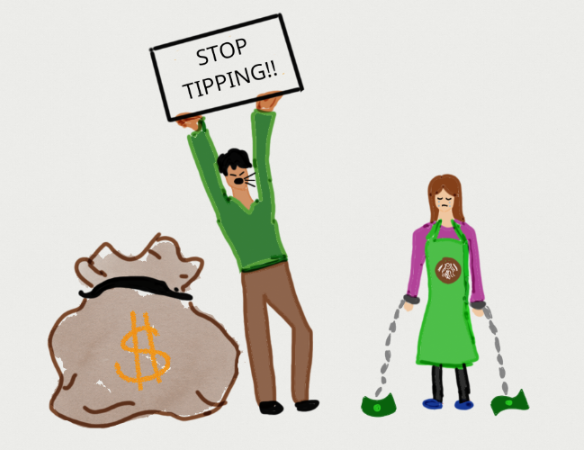Tipping Culture: It’s Deeper than You Think

While many overlook the importance of tipping workers, it is a crucial practice that acknowledges their hard work and services. Tipping culture prevents people from becoming bound to money and the prospect of its loss.
Tipping at least 20% of a meal’s cost has been a symbol of etiquette and respect in American culture for over a century, but recently the practice has been subject to scrutiny by shameless critics who are selfishly ignorant of the fundamental money flow that benefits all workers, especially young generations.
Though consumers may be surrounded by so-called reformists who aim to eradicate tipping culture, one must nonetheless be conscious of the positive economic impacts that their gracious donations can or cannot have on their general community and emerging peers.
A study conducted by Square showed that the average American tips around 16.4 percent of the check. These tips make up 65 to 100 percent of a low-wage worker’s salary, depending on the job; the more strenuous the physical labor, the more likely it is for a worker to receive a larger portion of the tip.
However, this widespread culture has been under fire in recent years by those whose self-oriented attributes cement them to an ignorance of the necessity of tipping. Such blindness to the hard work of employees who require these meager donations to fulfill economical needs often leads individuals to become increasingly and harmfully self-centered.
Students in college and high school sustain much of the impact of non-tippers. Many part-time workers consist of younger groups, such as teenagers and young adults who struggle to maintain independence by squeezing in work hours throughout their busy week.
Senior Hyunbin Jung, a cashier and server at Northpark’s BBQ Chicken, said that tipping culture has impacted his work experience by giving him the motivation to be more friendly with customers and make extra efforts during his shifts. He also explained how adolescents often depend on tips to become self-reliant to prepare for adulthood.
“I work once a week on Sunday nights because of school, sports, homework and college applications,” Jung said. “Of course, tipping is more important for students because for me, I need to save my money for college applications. Now, I pay for myself, and I don’t have to ask my parents anymore.”
With the financial burdens of teenagers ranging from gas bills to independently paying off college tuition, it is important that students have a steady source of income, even if it means having to work late hours during weekends. Customers who refuse to tip are denying youth the opportunity to access financial liberation, which can help them transition to becoming more self-reliant.
For some, tipping culture can seem like a cause of tension and hostility between customers and employees, according to The Conversation. They explain that tipping can sometimes put unwanted social pressure on customers, while workers are solely focused on the value of their tips.
However, it creates a fundamental system in which consumers and producers depend on one another to gain each other’s values. A healthy environment will be created due to the friendliness between a worker and a customer.
Base checks are payments for products, while tips are an appreciation for employees’ hard work and a source of motivation. Tipping also provides feedback on the level of an employee’s services and overall satisfaction.
Cornell University professor Michael Lynn conducted a study to explore the probable demographics of consumers if tipping systems were removed from society entirely.
“[T]he dynamics of tipping are such that if restaurants today were to eliminate tipping and replace it with an automatic service charge or higher menu prices, what you would find is some people would tip on top of those high menu prices on top of that service charge,” Lynn said in an interview with PBS Chasing the Dream.
Even if people stopped tipping, it would be replaced with alternative systems that charge customers extra for products, since low-wage workers can not maintain the same lifestyle with merely their base salaries. Not only does this method cause burdens and inequalities for consumers of financially-disadvantaged backgrounds, but it also causes a nationwide economic problem. When prices of goods increase, the purchasing power of consumers decreases, causing inflation and the general market demand to go down.
For example, Lynn’s study focuses on the restaurant chain Joe’s Crab Shack, which replaced tipping with higher menu prices. However, they were pressured to reverse the method and bring back tipping to most of its restaurants after merely six months.
“I found customers rated Joe’s Crab Shack restaurants higher – by about a third of a point on a five-point scale – when they operated under tipping than when they used service-inclusive pricing. Statistical tests indicated that this effect was highly unlikely due to chance,” Lynn said.
The failures of alternative systems to tipping only solidifies the sheer scale of its importance and ingenuity.
The overwhelming reasonings that encourage tipping culture can only serve as a motivation. The decision to contribute eventually comes down to the choice of each individual.
It is a choice whether one is willing to contribute to society. It is a choice whether one will support young peers. In the end, it is one’s own decision in recognizing the duty to accept morals of decency.
The collective desire to tip as much as they can be present in all people. The importance of tipping is deeply embedded in American culture has a positive impact on opening opportunities for all people.
Therefore, no matter the reasoning behind your tips, next time when walking into a restaurant or shop, think of the impact that your acts of gratitude can have, not only on yourself, but also on the various peers who depend on you.
Your donation will support the student journalists of Portola High School. Your contribution will allow us to purchase equipment and cover our annual website hosting costs.

Hannah Ko is the Opinion Editor for her third and final year on the Portola Pilot. This year, she is excited to create meaningful opinion stories especially...



